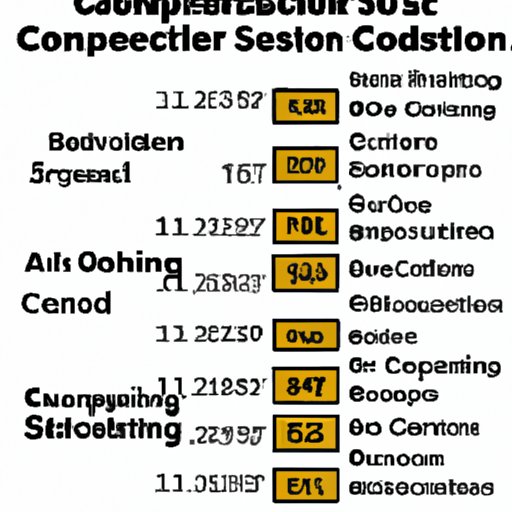Computer Science Careers: Making the Right Educational Choice for Your Future

Computer science careers: make the right educational choice for your future
Choose a career path is one of life’s nigh significant decisions. For those consider computer science, questions about job prospects, educational requirements, and personal fit frequently arise. This comprehensive guide address these concerns to help you make an informed decision about pursue a computer science degree.
The current computer science job market
The tech industry continues to be one of the virtually dynamic and firm grow sectors in the global economy. But what does this mean forjobseekerss with computer science backgrounds?
Job availability in computer science
Despite occasional reports of layoffs at major tech companies, the overall demand for computer science professionals remain strong. The bureau of labor statistics projects that computer and information technology occupations will grow 15 % through the current decade, practically fasting than the average for all occupations.

Source: carreersupport.com
This growth translate to roughly 682,800 new jobs being added to the already substantial tech workforce. Areas experience especially high demand include:
- Artificial intelligence and machine learning
- Cybersecurity
- Cloud computing
- Data science and analytics
- Full stack development
- Mobile application development
Competition for entry level positions
While the overall job market is robust, entry level positions can be competitive. Many graduates report that land their first tech job is frequently the about challenging step in their career journey. This competition stem from several factors:
- The increase number of computer science graduates
- Boot camp graduates enter the job market
- Self-teach programmers compete for the same positions
- Employers oftentimes seek candidates with some practical experience
Yet, this initial hurdle doesn’t indicate a poor job market boiler suit. Kinda, ithighlightst the importance of differentiate yourself during your education through internships, projects, and specialized skills.
The value of a computer science degree
With alternative learn paths to code boboot campsnd self direct learning become more popular, many wonder if a traditional computer science degree is stock still worth the investment.
Advantages of formal computer science education
A computer science degree offer several distinct advantages that alternatives may not full provide:
Comprehensive theoretical foundation
University programs teach fundamental concepts that transcend specific programming languages or technologies. This includes:

Source: tffn.net
- Algorithms and data structures
- Computational theory
- Computer architecture
- Operate systems principles
- Database design fundamentals
This theoretical knowledge provide adaptability throughout your career as technologies evolve.
Broader skill development
Degree programs typically include courses that develop complementary skills such as:
- Technical writing and communication
- Teamwork through group projects
- Problem solve methodologies
- Project management fundamentals
- Research skill
Networking and career resources
Universities provide valuable opportunities beyond coursework:
- Access to internship programs with partner companies
- Career fairs specific to tech industries
- Alumni networks for mentorship and job referrals
- Research opportunities with faculty
Credential recognition
While the tech industry is progressively skills focus, many employers ease use degrees as an initial screening tool:
- Some job listings explicitly require bachelor’s degrees
- Certain visa applications for international work may require formal education
- Government and defense contractor positions frequently mandate degrees
- Advancement to management positions may be easier with formal education
Alternatives to traditional degrees
It’s important to acknowledge that a traditional four-year degree isn’t the only path into the tech industry:
Code boot camps
Intensive programs last 3 6 months that focus on practical development skills. These work wellspring for career changers who need to chop chop develop marketable programming skills, though they typically lack the theoretical depth of degree programs.
Self-directed learning
With abundant online resources, motivated individuals can learn program severally. This requires exceptional discipline and self motivation but allow for flexible,cost-effectivee learning.
Associate degrees and certificates
Two year programs or specialized certificates can provide focus technical training at a lower cost than four year degrees, oft with good employment prospects for specific roles.
Is computer science the right fit for you?
Beyond market considerations and educational options, a crucial question remains: is computer science align with your aptitudes, interests, and work preferences?
Aptitude that support success in computer science
While anyone can learn program with sufficient dedication, certain natural inclinations may make the journey smoother:
Analytical thinking
Computer science basically involves break complex problems into manageable components. If you enjoy puzzles, logic games, or find systematic solutions to problems, you may thrive in this field.
Attention to detail
Programming require precision. A single misplaced character can cause an entire system to fail. Those who course pay attention to small details oftentimes excel in code tasks.
Persistence
Debug code and solve technical problems can be frustrating. The ability to persist through challenges without become discourage is invaluable in this field.
Continuous learning orientation
Technology evolve quickly. Successful computer scientists embrace lifelong learning and adapt to new languages, frameworks, and paradigm throughout their careers.
Common misconceptions about computer science
Several myths might discourage potential candidates from enter the field:
” yYoumust be a math genius ”
While mathematical thinking is helpful, many programming roles require only basic algebra. Specialized areas like machine learning or graphics programming demand more advanced math, but many successful developers have modest mathematical backgrounds.
” yYouneed to start programming as a child ”
Many successful developers begin learn in college or eve former as career changers. Early exposure isn’t necessary for success.
” iIts all solitary work ”
Modern software development is extremely collaborative. Teams work unitedly on code reviews, pair programming, and project planning. Communication skills are progressively value in the industry.
” yYouneed to know every programming language ”
Understand core programming concepts is more important than specific languages. Once you master fundamentals, learn new languages become increasingly easier.
Prepare for success in computer science
If you decide to pursue computer science, several strategies can maximize your chances of success in both education and job hunting.
During your education
Whether in a degree program or alternative learn path, focus on:
Build a project portfolio
Create personal projects that demonstrate your skills. These projects should:
- Solve real problems (flush small ones )
- Showcase different technical capabilities
- Demonstrate your code style and documentation skills
- Be available on GitHub or similar platforms for potential employers to review
Gain practical experience
Theoretical knowledge unequalled isn’t enough in today’s job market:
- Apply for internships former and oftentimes
- Contribute to open source projects
- Participate in hackathons and code competitions
- Consider part-time development work during your studies
Network within the industry
Build professional connections can lead to mentorship and job opportunities:
- Attend tech meetups and conferences
- Join online communities relate to your interests
- Connect with alumni work in tech
- Participate in code forums and discussion groups
Job search strategies
When enter the job market, consider these approaches:
Cast a wide net
Don’t limit yourself to the nigh recognizable tech companies. Opportunities exist in:
- Smaller startups (which may offer more responsibility and learn opportunities )
- Non-tech industries that need technical talent (healthcare, finance, manufacturing )
- Government and public sector organizations
- Remote positions that expand your geographical options
Emphasize soft skills
Technical abilities matter, but employers progressively value:
- Communication skill
- Teamwork and collaboration
- Problem solve approach
- Adaptability and willingness to learn
Consider starting positions
Your first role doesn’t need to be your dream job:
- Quality assurance positions can be step stones to development roles
- Technical support roles provide valuable industry experience
- Internships oftentimes convert to full-time positions
Make your decision
The decision to pursue computer science should be personal and informed. Consider these final reflections:
Try before you commit
Before invest in a full degree program:
- Take free online programming courses to test your interest
- Attend code workshops or short courses
- Try to solve basic programming challenges on platforms lileet codeodehacker rankrank
- Talk to professionals in the field about their daily work
Assess your long term goals
Consider how computer science align with your broader life objectives:
- Does the work environment appeal to you?
- Are the salary prospects align with your financial goals?
- Does the field offer the work-life balance you desire?
- Are there specializations within computer science that specially interest you?
Remember that paths are not linear
Many successful tech professionals have taken unconventional routes:
- Some begin in adjacent fields like mathematics or physics
- Others transition from altogether unrelated careers
- Many combine computer science with domain expertise in other areas
Conclusion
Is it hard to get a job in computer science? The entry point can be competitive, but the overall market remains strong with abundant opportunities for those who demonstrate skills and persistence.
Should you get a computer science degree? A formal degree offer comprehensive knowledge and certain advantages, but alternative paths can besides lead to successful careers depend on your circumstances and goals.
Is computer science for you? This depends on your aptitudes, interests, and work preferences. The field reward analytical thinking, attention to detail, persistence, and a love of continuous learning.
Computer science offer rewarding careers with excellent compensation and the opportunity to work on meaningful problems. By thoughtfully consider your options and prepare strategically, you can make an informed decision about whether to pursue this dynamic field.






